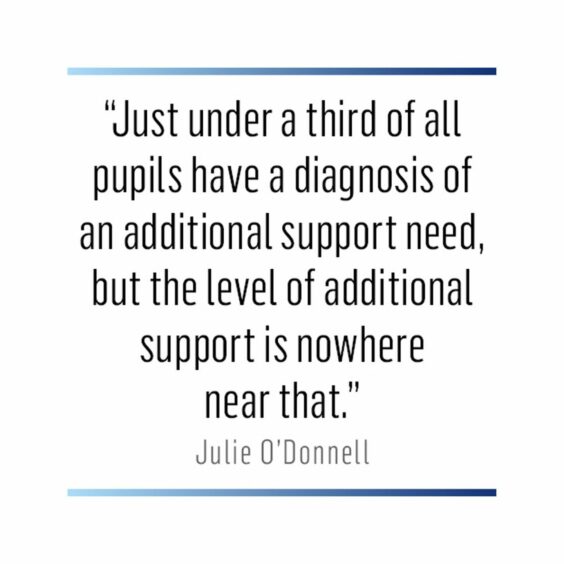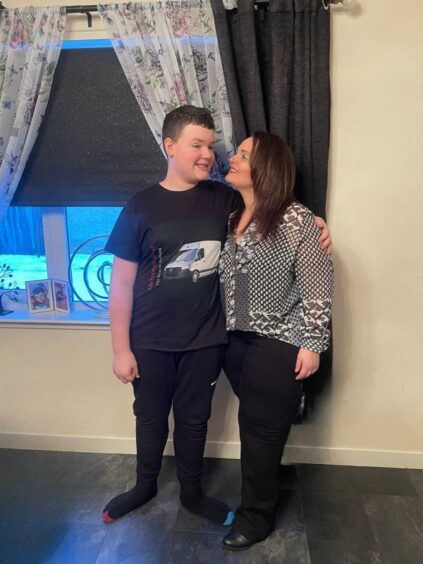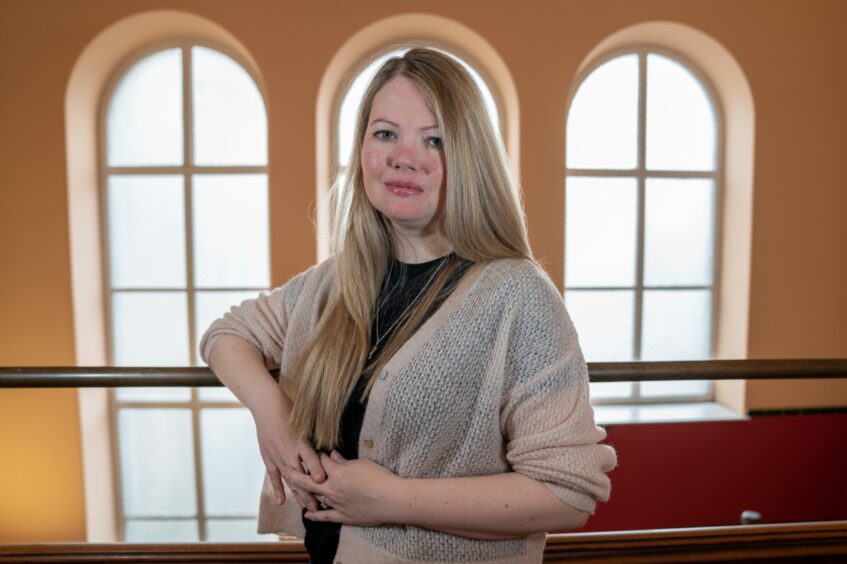Lisa Moir is autistic, and so is her 12-year-old son Stuart.
As a widower, Lisa wanted to protect Stuart’s education in case anything happened to her.
In many cases, the magical key to access that protection is something called a Co-ordinated Support Plan (CSP).
These back up in law the rights of children with complex needs, including autism.
Yet across Scotland, less than 1% of pupils with additional support needs have one.
So what has gone wrong?
Lisa and Stuart’s story
I spoke to more than 20 families in the north and north-east for this special series of reports.
The families described their frustration, exhaustion and sense of ‘battling’ the system to get support for autism.
Some described an excellent standard of care – but only after a traumatic process to get a CSP in place.
Others said the school was excellent, but there wasn’t enough respite support.
Many described having to go private or take their council to court.
Lisa and Stuart have gone through all that and more. Here is their story.
Lisa’s son Stuart was diagnosed autistic at the age of three, and it marked the beginning of a painful journey for Lisa.
With a background in health and social care, Lisa had more insight than most parents into the many challenges facing the most vulnerable people in our society. Yet she was about to experience it all first hand.
“I don’t think I’ll ever forget how isolated and alone I felt,” she says.
Lisa took a career break to care for Stuart and her husband, who had a severe disability. Sadly, her husband passed away around the same time that Stuart was diagnosed.
Lisa turned the tragedy into a new sense of purpose. “After the darkness had passed enough that I could think clearly, I decided I wanted to create change, no matter how small,” she says.
Lisa put her professional and personal experiences to good use, and established her own autism consultancy and a parent support group, Spikkin Autism and More.
Getting autism support is ‘draining and exhausting’
Lisa describes her own experiences with the education system as a “battle” and now dedicates her time to helping other parents in the same situation.
To get Stuart the support he needs, she took Aberdeenshire Council to tribunal on two occasions – once at the beginning of primary school and again in P7. All so that he could have a Co-ordinated Support Plan.
“As a lone parent, I’m all Stuart has,” explains Lisa. “I need to know his education will be supported if I’m not around. A CSP is the only plan that gives that legal protection.”
However, Lisa has mixed feelings about whether it really delivers. While Stuart’s support in secondary school has been excellent, she feels the system is set up to fail.
“There are many exceptional and outstanding areas of support, and it’s important to tell positive stories just as loudly as the negative ones,” says Lisa. “There is some outstanding practice but too often it falls on the shoulders of individual members of staff rather than the system itself.”
Lisa says councils will “try everything first” before putting a CSP in place.
“They don’t freely tell you what information, support and resources are available – you have to go and find out for yourself,” she says.
“It’s draining and exhausting. I hope through my services to be able to support parents to go forward with confidence.”
Council says it’s committed to meeting all children’s needs
Aberdeenshire Council said it cannot comment on individual cases. However, Vincent Docherty, Head of Education at Aberdeenshire Council, said schools in the area use the principles of Getting It Right For Every Child. Support is planned with parents, schools and agencies as needed.
“Any parent who has concerns is encouraged to discuss this with their child’s school in the first instance,” he said.
He added: “With more than 95% of children and young people in Aberdeenshire going on to a positive post school destination and our commitment to delivering a curriculum which helps all young people reach their full potential, we are confident our approach is working well.”
Co-ordinated support plan figures
However, the picture nationally is one of increasing need, and declining support.
Since 2011, the proportion of children diagnosed with additional support needs has more than doubled.
But at the same time, there are 503 fewer ASN teachers nationally.
And the number of CSPs across Scotland has dropped by 64%.
We looked at the figures for the north-east of Scotland. In primary schools across the area, less than 1% of ASN children had a CSP in 2021. The lowest was Aberdeen City, with 0.16% – a decrease of 43% since 2011.
Only four councils broke the 1% mark, with the Outer Hebrides topping the charts at 2.34%.
The figures for secondary school are worse. Just 0.16% of Aberdeenshire pupils with an ASN requirement had a CSP in 2021. That’s the lowest in Scotland.
See below for detailed results across the north and north-east.
Working to reverse the trend
“There is a chronic problem with CSPs,” says Jennifer Barr, a solicitor with Govan Law Centre, who has helped hundreds of families access educational support.
“The idea is great but the problem is how it translates to reality. Simply, the people who need them are not receiving them.”
When asked for comment, Aberdeen City said it is “committed to meeting the needs of all our learners.” Since 2019, it has provided schools with support about CSP guidance and started to issue more.
“Currently we have 30 active CSPs with six to be reviewed and two in development,” said the spokesperson. “Since streamlining our process in May 2021 and sharing with schools, there have been 18 new considerations for a CSP for learners in Aberdeen. Of those considered, seven met the statutory criteria for a Coordinated Support Plan.”
Aberdeenshire Council also said it’s reviewing its CSP process. It has 22 in place at the time of writing.
“Around 43% of our school population is recorded as receiving help with additional support needs, and that help is shaped around their unique needs and circumstances. Funding and resourcing around this remains consistent with previous years,” said Mr Docherty.
What you need to know about CSPs
According to the Scottish Government, a CSP is: “The statutory education plan for children and young people with additional support needs (ASN).”
Specifically, it’s for young people with ‘multiple’ needs that will continue for more than a year. These young people will need support from more than one source – so not just the education authority, but social work or the NHS, for example.
Under the Education (Additional Support for Learning) Scotland Act 2004, councils must provide a CSP if a young person meets this criteria. Parents and carers have the right to ask for an autism assessment and to challenge decisions. Children aged 12-15 have these rights too.
CSPs are unique to each child, but will generally include the following:
- information about the young person
- a summary of the support they need to benefit from education in the year ahead
- educational outcomes and the involvement of the school and other agencies in achieving these
- specific information on the range, type and frequency of support, who is providing it and how it will be co-ordinated
- the views of the young person, parents/carers and the school
‘In reality, you request one, and it’s refused’
Many councils turn to documents such as a Child’s Plan or Individualised Education Programme (IEP) to detail support. These have their place, but CSPs are the only plans that are backed up in law.
On paper, when a CSP is drawn up, agencies are legally obliged to provide that support.
Sadly, Jennifer says that’s not how it usually goes. “How it should work is that each child is assessed without having to request it, and if they qualify for a CSP, they get one.
“In reality, you request one, and it’s refused.”
At this point, parents have a right to appeal. Some turn to the free advocacy service provided by Govan Law to take their council to tribunal. The results are telling: “In 95% of cases the local authority is told to prepare a CSP,” says Jennifer.
Shortage of teachers to support autistic needs
So how widespread is this problem?
The P&J spoke to the Scottish Children’s Services Coalition (SCSC). They say more and more children are now diagnosed with additional needs such as autism, yet support has plummeted.
Julie O’Donnell is chief operating officer of education charity Love, a member of the SCSC.
“Just under a third of all pupils have a diagnosis of an additional support need, but the level of additional support is nowhere near that,” says Julie.
“Excluding kids from school is very much a thing of the past. The focus is on inclusion in mainstream with additional support. But is that support a reality?”
 Love provides educational and respite services to support children to maintain their education. Demand on their services is huge, but Julie says charities should not pick up the gaps in core services.
Love provides educational and respite services to support children to maintain their education. Demand on their services is huge, but Julie says charities should not pick up the gaps in core services.
“The reality is that shouldn’t need to go out to third sector organisations. The purpose was to have X number of ASN teachers to X number of ASN children.”
Julie says much of the burden falls to families, who struggle with financial hardship and psychological distress. “It has a huge impact on the family unit,” she says.
The Scottish Government knows there’s a problem with CSPs
While councils insist that autism support is there, the Scottish Government itself recognises there’s a problem.
In 2019, it agreed to form a short-life working group to look at CSPs, in response to “consistent concerns” about the low number given out nationally.
These concerns were flagged up as part of an earlier review into additional support for learning, which found: “widespread misunderstanding by parents, carers and professionals too, about the purpose, relationship to other planning mechanisms, (usually the Childs Plan), eligibility, or legal entitlement /requirement for a CSP.”
The Scottish Government published its CSP report last November. It found that:
- public bodies need to ensure that information on CSPs is available, accessible and shared at the earliest possible stage
- there is variation in awareness and understanding of the legislation
- the process can be lengthy and cause stress and frustration to all involved
- education and health need sufficient resources to provide support
The Scottish Government is now looking to develop information and guidance for families and professionals, to boost understanding of council’s statutory duties and cut the red tape.
Crucially, the Government also acknowledges it may need to find more money to keep up with soaring demand.
For the families we spoke to, that’s can’t happen quickly enough.
- Lisa Moir can be contacted at ascs.scot@gmail.com or via her Autism Specific Consultancy Services Scotland website.
Useful links:
Scottish Autism
National Autistic Society Scotland
Govan Law Centre
Read more from our autism investigation
What are the signs of autism in children and how can I get support?



Conversation